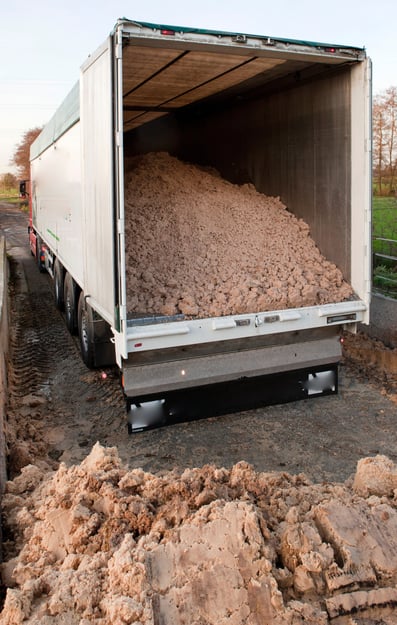The transportation industry is always changing and evolving, developing new ways to make it easier to send and receive freight. Among the industry’s many creative solutions are moving floor trailers, a specialized trailer type designed to make loading and unloading freight more efficient.
Moving floor trailers hit the commercial market in the 70s and have slowly grown in popularity since. Trucking industry TikTok content has recently boosted interest in moving floor trailers, especially from shippers and drivers.
It’s true that these trailers boast innovative mechanics, but a question remains: Do moving floor trailers offer value beyond their aesthetics?
At Anderson Trucking Service, Inc. (ATS), we stay up-to-date on trends so we can better answer our customers' and drivers' questions.
In this article, we’ll explain how a moving floor trailer works, the freight it hauls best, and its pros and cons.
Stick around to the end to get our expert take on whether these unique trailers are the right solution for you.
- What is a moving floor trailer?
- How does a moving floor trailer work?
- What freight types do moving floor trailers haul?
- Pros of using a moving floor trailer
- Cons of using a moving floor trailer
- Do I need a moving floor trailer for my freight?
What Is a Moving Floor Trailer?
If you’re imagining a trailer with a floor like a moving walkway at an airport, you’re actually not far off. Today’s moving floor trailer has an old school ancestor — called a “live trailer,” “live bottom trailer,” or “live floor trailer” — that used a conveyor belt to move freight out of the back at a controlled rate.
Back in the day, those dump truck alternatives were primarily used on construction sites and in agriculture. Now, modern moving floor trailers have upped the versatility even more.
A moving floor trailer is a semi-trailer with a hydraulically-powered floor composed of moving slats. The slat system automates and facilitates the loading and unloading of freight.
You may have heard moving floor trailers also referred to as “walking” or “walking floor” trailers. Walking Floor® is a registered trademark of KEITH Manufacturing Co mpany, a trailer brand.
This means all Walking Floor trailers are moving floor trailers, but not all moving floor trailers are Walking Floor trailers.
It’s like Kleenex vs. facial tissues: Laypeople use the terms interchangeably because of the popularity of a certain brand, but they’re not always synonymous.

How Does a Moving Floor Trailer Work?
A moving floor trailer uses mechanized slats to move freight forward and backward. A driver must operate the hydraulically-powered floor, which requires special training.
A standard moving floor trailer has 21 slats. Variations equipped with 15 or 24 slats are also available. Moving floors with fewer slats can move heavier loads than those with more slats.
The mechanized slats are divided into three sets, with every third slat connected. The slat sets can move forward and backward either in unison or alternatively.
To load and unload freight, the driver of a moving floor trailer stands a safe distance away from the trailer and operates the floor remotely. This is to avoid potential injury to the operator. Like an escalator, there is a risk of getting caught in the automated movement of the floor.
The operator determines the direction of the freight's travel by controlling the movement of the slats. Moving the slats in unison moves the load into or out of the trailer.
To retract the floor without changing the position of the load, the operator moves only one set of slats at a time. The friction of the load itself weighing upon the two stationary sets of slats keeps it in place while the moving set of slats alternate sliding by.
A similar version of this moving floor was developed to move pallets. This system uses just two sets of slats and incorporates up-down motion in addition to forward-back.
To move freight using the pallet-specific system, one set of slats first raises the load slightly, just enough for the other to retract. The raised set then lowers the freight and retracts. Once this second retraction is complete, both sets work in unison to actually move the load in or out of the trailer.

What Freight Types Do Moving Floor Trailers Haul?
In a word: Bulk. The moving floor system makes it easy to move solid bulk freight without mess or extra steps.
Moving floor trailers make quick work (5-15 minutes to unload a 45-foot trailer) of dry bulk, from grain to mulch to produce and beyond.
Moving floor trailers are ideal for depositing materials directly onto a tarp, conveying floor, or the next stage of a receiver’s process. This seemingly simple capability helps optimize the flow of product for both the carrier and receiver.
Moving floor trailers are also used for pallets and floor-loaded products like furniture.
They eliminate the physical strain on workers and the extra equipment needed to maneuver the freight to the back of the trailer. Some moving floor trailers can also handle full-width or -length pallets without opening the sides.
Pros of Using a Moving Floor Trailer
The primary benefit of moving floor trailers is efficiency.
A moving floor trailer requires less time, equipment and manpower to unload than a standard dry van trailer. They make life easier for drivers and loading dock workers by streamlining the loading and unloading process.
When moving bulk freight, moving floor trailers also eliminate the need to tilt or tip the trailer or trailer floor.

There is also no need for a forklift to enter the trailer when loading and unloading palletized freight.
This kind of efficiency is sought-after by both shippers and carriers. The faster the freight loads and unloads, the faster it can proceed to the next stage of the supply chain — and the driver to their next load.
Cons of Using a Moving Floor Trailer
Moving floor trailers are an enticing innovation, especially for shippers of bulk or palletized freight. Unfortunately, you may have trouble finding one in your area, and if you do, you can expect to pay more.
Because the best uses for a moving floor trailer are quite specialized, most providers are unlikely to have moving floor trailers in their fleet.
“Specialized” is the operative word here. Any time you opt for a specialized trailer, prepare for costs to increase. Compared to a dry van, moving floor trailers aren’t outlandishly expensive, but they're still an extra cost.
Dry vans and flatbeds can move all the same freight as a moving floor trailer without the added expense. They’re also much more commonplace in the industry, so you’re more likely to find capacity.
Of course, the downside to these standard trailers is the labor required to load and unload them — but that’s been standard in freight transportation since man invented the wheel.
Do I Need a Moving Floor Trailer for My Freight?
Moving floor trailers are certainly an efficient solution for loading and unloading freight, but they’re more “nice-to-have” than “must-have.”
Moving floor trailers can be useful for shipping large, consistent quantities of bulk or palletized freight. The hydraulic floor simplifies moving loose or heavy cargo without extra manpower or equipment.

But because these trailers are specialized (and their use is not widespread across industries), it may be difficult to find a moving floor trailer near you. If you do find one, you’ll pay a little more than you would for a dry van or flatbed trailer.
The truth is, most transportation providers will steer customers toward a standard trailer instead. It's easier and less costly to find capacity with a dry van or flatbed, and more providers offer them.
The exception? Businesses shipping dry bulk freight all day, every day. If that's you, you might consider seeking out a moving floor trailer's efficiencies.
If you’re interested in exploring your trailer type options, check out our article on The 11 Most Common Trailer Types Used in the Trucking Industry in 2024. It breaks down the most popular trailer types with visual aides, standard sizing details, fast facts, and more.
You can also always reach out to ATS with any questions about trailer types and finding your best-fit solution. While we don’t have moving floor trailers in our network, we’d be happy to help you find a provider that does, or talk you through our available options.



